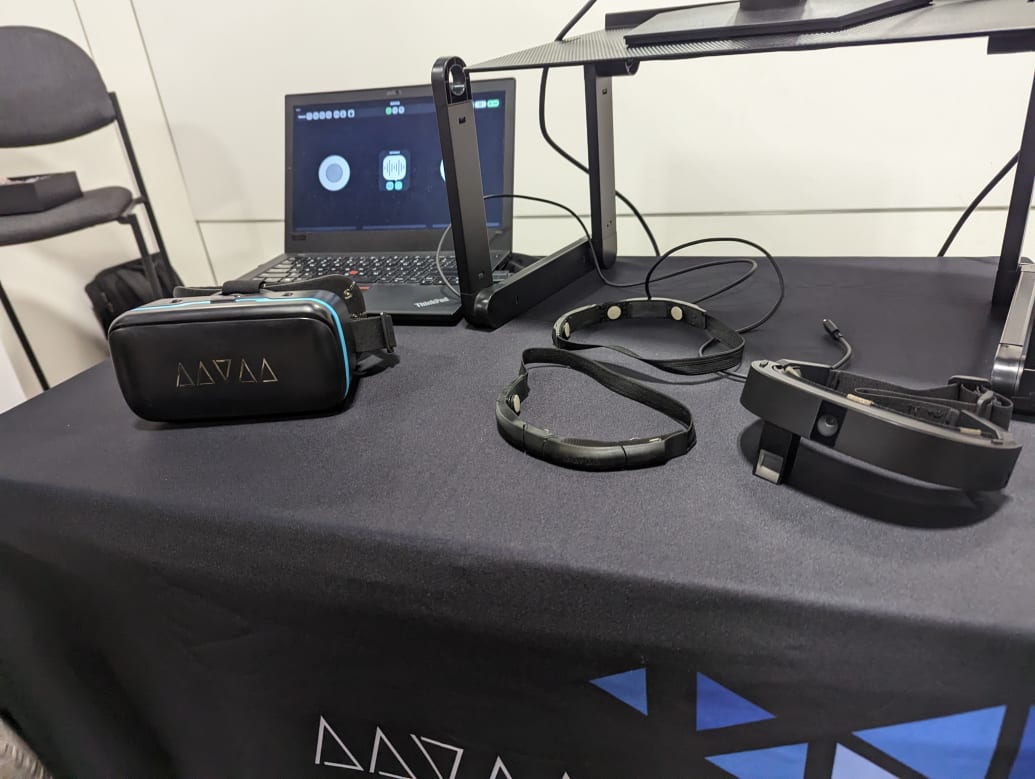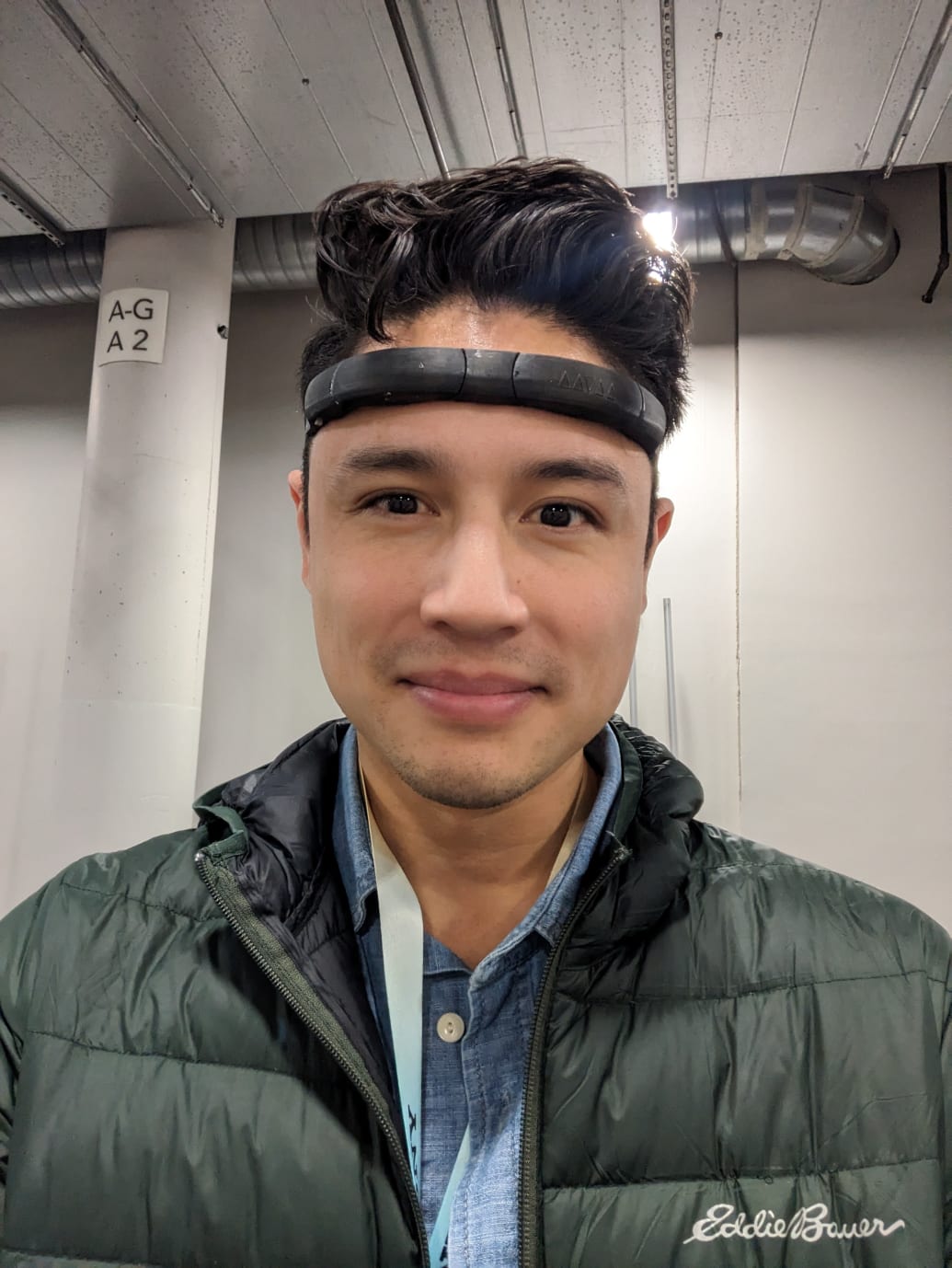It felt like magic: As I moved my head and eyes throughout the pc display screen, the cursor moved with me. My purpose was to click on on footage of targets on the show. As soon as the cursor reached a goal, I might blink inflicting it to click on on the goal—as if it have been studying my thoughts.
In fact, that’s primarily what was occurring. The scarf I used to be carrying picked on my mind, eye, and facial alerts. This information was fed by an AI-software that translated it into instructions for the cursor. This allowed me to manage what was on the display screen, despite the fact that I didn’t have a mouse or a trackpad. I didn’t want them. My thoughts was doing all the work.
“The mind, eye, and face are nice turbines of electrical energy,” Naeem Kemeilipoor, the founding father of brain-computer interface (BCI) startup AAVAA, informed The Day by day Beast on the 2024 Client Electronics Present. “Our sensors decide up the alerts, and utilizing AI we will interpret them.”
The scarf is only one of AAVAA’s merchandise that guarantees to carry non-invasive BCIs to the buyer market. Their different gadgets embrace AR glasses, headphones, and earbuds that every one primarily accomplish the identical operate: studying your mind and facial alerts to help you management your gadgets.
Whereas BCI expertise has largely remained within the analysis labs of universities and medical establishments, startups like AAVAA are in search of methods to place them within the palms—or, quite, on the heads—of on a regular basis folks. These merchandise transcend what we sometimes count on of our good gadgets, seamlessly integrating our mind with expertise round us. Additionally they supply numerous hope and promise for folks with disabilities or restricted mobility—permitting them to work together with and management their computer systems, smartphones, and even wheelchairs.
Nonetheless, BCIs additionally blur the strains between the tech round us and our very minds. Although they are often useful for folks with disabilities, their widespread use and adoption raises questions and considerations about privateness, safety, and even a person’s very personhood. Permitting a tool to learn our mind alerts throws open the doorways to those moral concerns so, as they steadily change into extra well-liked, they might change into extra harmful as effectively.

AAVAA’s BCI gadgets on a desk at CES 2024. AAVAA is in search of methods to place them within the palms—or, quite, on the heads—of on a regular basis folks.
Tony Ho Tran
Work All Day, Sleep All Night time
BCIs loomed massive all all through CES 2024—and for good cause. Past having the ability to management your gadgets, wearables that might learn mind alerts additionally promised to supply better insights into customers’ well being, wellness, and productiveness habits.
There have been additionally quite a lot of gadgets focused at enhancing sleep high quality such because the Frenz Brainband. The scarf measures customers’ brainwaves, coronary heart price, and respiratory (amongst different metrics) to supply AI-curated sounds and music to assist them go to sleep.
“Each day is totally different and so every single day your mind can be totally different,” a Frenz spokesperson informed The Day by day Beast. “As we speak, your mind may really feel like white noise or nature sounds. Tomorrow, you may want binaural beats. Primarily based in your mind’s reactions to your audio content material, we all know what’s finest for you.”
To supply the noises, the scarf used bone conduction, which converts audio information into vibrations on the cranium that journey to the inside ear producing sound. Although it was troublesome to listen to clearly on the crowded present ground of CES, the scarf managed to provide soothing beats as I wore them in a demo.
“While you go to sleep, the audio robotically fades out,” the spokesperson mentioned. “The scarf retains monitoring all evening, and if you happen to get up, you possibly can press a button on the aspect to begin the sounds to place you again to sleep.”
Nonetheless, not all BCIs are fairly as useful as they could seem. For instance, there was MW75 Neuro, a pair of headphones from Grasp and Dynamic that purports to learn your mind’s electroencephalogram (EEG) alerts to supply insights in your degree of focus. In the event you change into distracted or your focus wanes for no matter cause, it alerts you so you possibly can preserve productiveness.
Positive, this might sound useful if you happen to’re a pupil seeking to squeeze in some extra high quality research time or a author making an attempt to hit a deadline on a narrative, however it’s additionally a stark and grim instance of late-stage capitalism and a tradition obsessive about work and productiveness. Whereas this expertise is comparatively new, it’s not troublesome to think about a future the place these headphones are extra commonplace and—probably—required by workplaces.
An Moral Minefield
When most individuals take into consideration BCIs, they sometimes consider brain-chip startups like Synchron and Neuralink. Nonetheless, these applied sciences require customers to bear invasive surgical procedures with a view to implant the expertise. Non-invasive BCIs from the likes of AAVAA, however, require only a headband or headphones.
That’s what makes them so promising, Kemeilipoor defined. Not would it not be restricted to solely these customers who actually want it like these with incapacity points. Any person can pop on the scarf and begin scrolling on their laptop or turning their lamps and home equipment on and off.

The Day by day Beast’s intrepid reporter Tony Ho Tran wears AAVAA’s headband, which guarantees to carry non-invasive BCIs to the buyer market.
Tony Ho Tran
“It’s out of the field,” he defined. “We’ve finished the coaching [for the BCI] and now it really works. That’s the great thing about what we do. It really works proper out of the field—and it really works for everybody.”
Nonetheless, the truth that it will possibly work for everybody is a prime concern for moral specialists. Expertise like this creates a minefield of potential privateness points. In any case, these corporations might probably have fully unfettered entry to information from our literal brains. That is data that may be purchased, offered, and used towards shoppers in an unprecedented means.
One complete evaluation revealed in 2017 within the journal BMC Medical Ethics identified that privateness is a serious concern for potential customers because of this. “BCI gadgets might reveal a wide range of data, starting from truthfulness, to psychological traits and psychological states, to attitudes towards different folks, creating potential points resembling office discrimination primarily based on neural alerts,” the authors wrote.
To their credit score, Kemeilipoor was adamant that AAVAA would and doesn’t have entry to particular person mind sign information. However the considerations are nonetheless there, particularly since there are notable examples of tech corporations misusing person information. For instance, Fb has been sued a number of instances for thousands and thousands of {dollars} for storing customers’ biometric information with out their data or consent. (They’re definitely not the one firm doing this both.)
These points aren’t going to go away—and so they’ll be additional exacerbated by the infusion of expertise and the human mind. This can be a phenomenon that additionally brings up considerations about personhood as effectively. At what level, precisely, does the human finish and the pc start as soon as you’ll be able to primarily management gadgets as an extension of your self like your arms or legs?
“The query—is it a instrument or is it myself?—takes on an moral valence when researchers ask whether or not BCI customers will change into ‘cyborgs,’” the authors wrote. They later added that some moral specialists fear that “being extra robotic makes one much less human.”
But, the advantages are plain—particularly for these for whom BCIs might give extra autonomy and mobility. You’re not restricted by what you are able to do along with your palms. Now, you possibly can management the issues round you just by wanting in a sure course or transferring your face in a selected means. It doesn’t matter if you happen to’re in a wheelchair or fully paralyzed. Your thoughts is the restrict.
“This sort of expertise is just like the web of people,” Kemeilipoor mentioned. “That is the FitBit of the longer term. Not solely can you monitor all of your biometrics, it additionally means that you can management your gadgets—and it’s coming to market very quickly.”
It’s promising. It’s scary. And it’s additionally inevitable. The most important problem that all of us should face is that—as these gadgets change into extra well-liked and we regularly give over our minds and our bodies to expertise—we don’t lose what makes us human within the first place.
